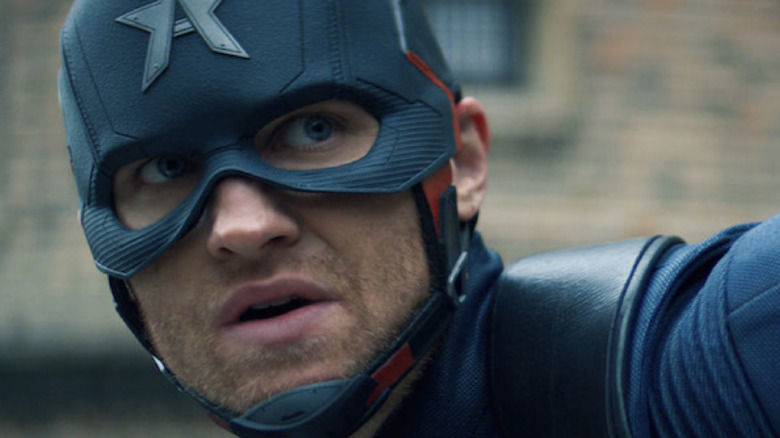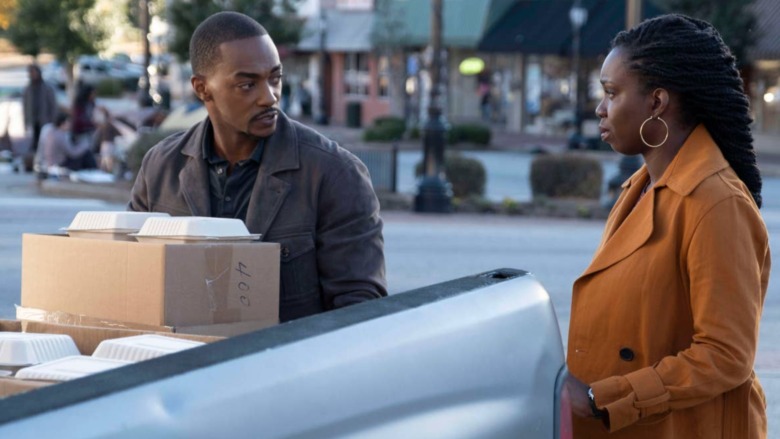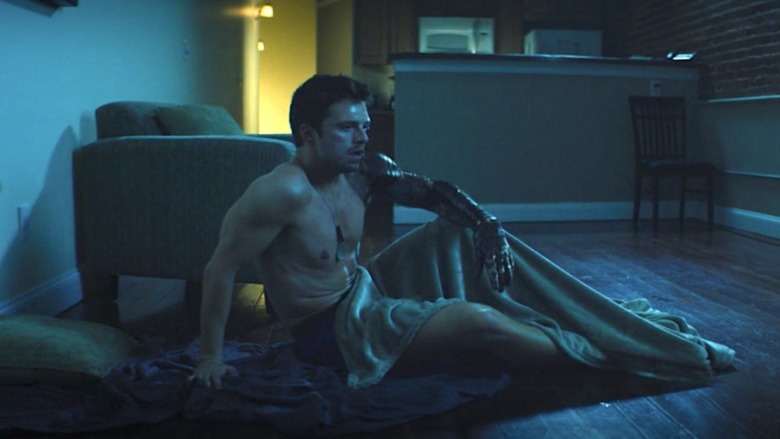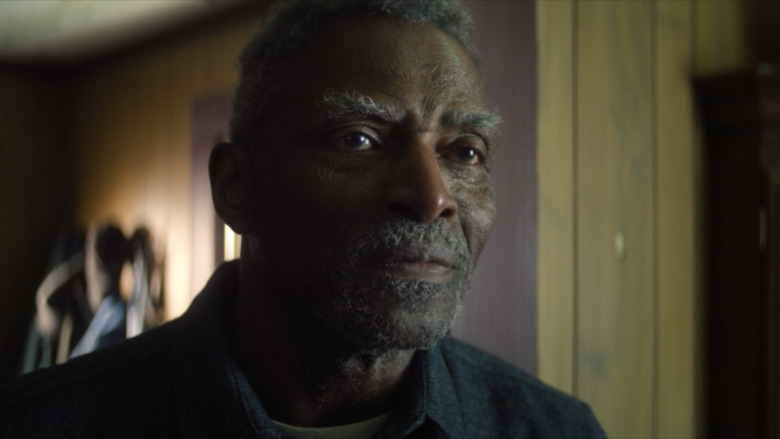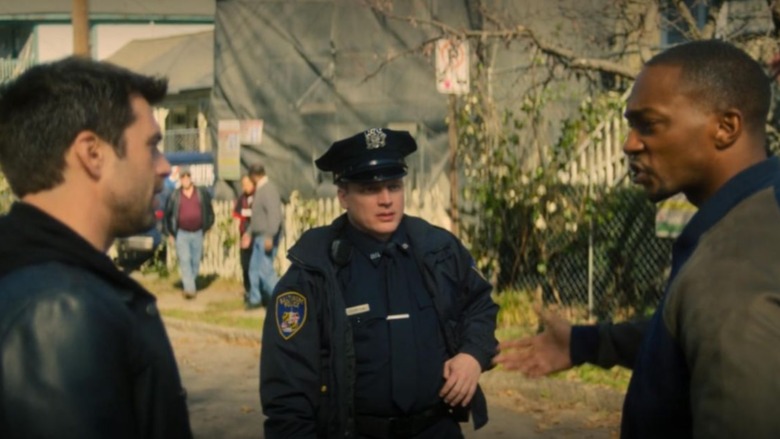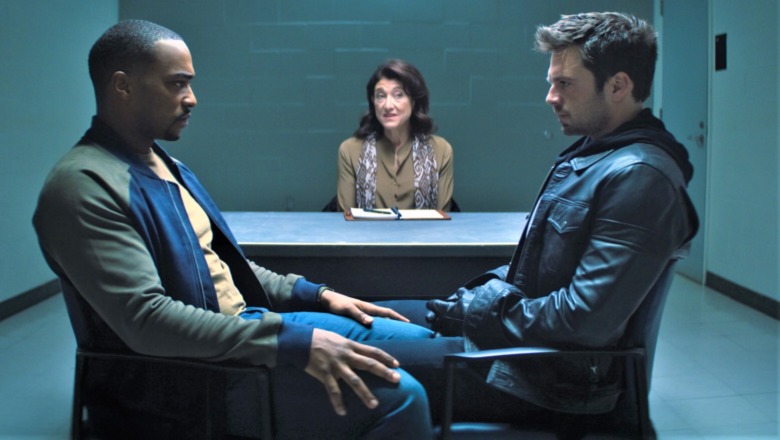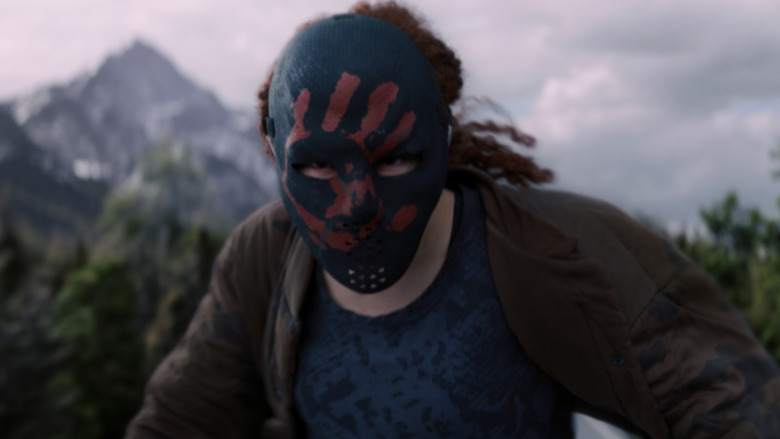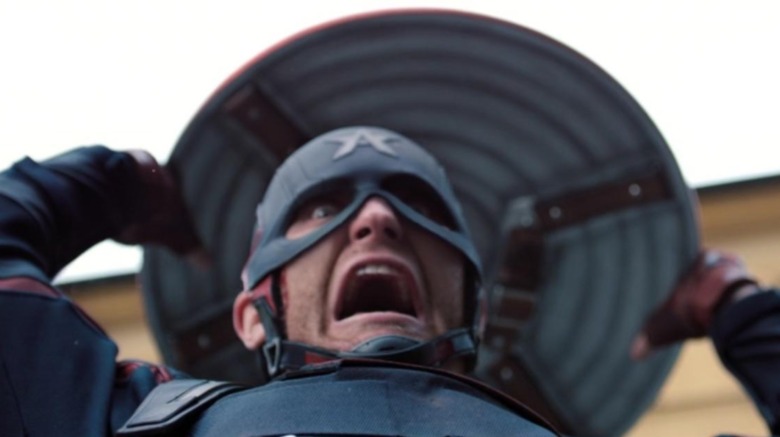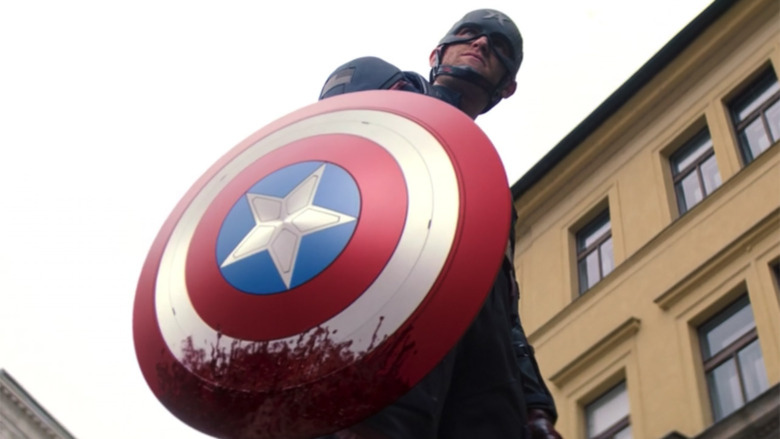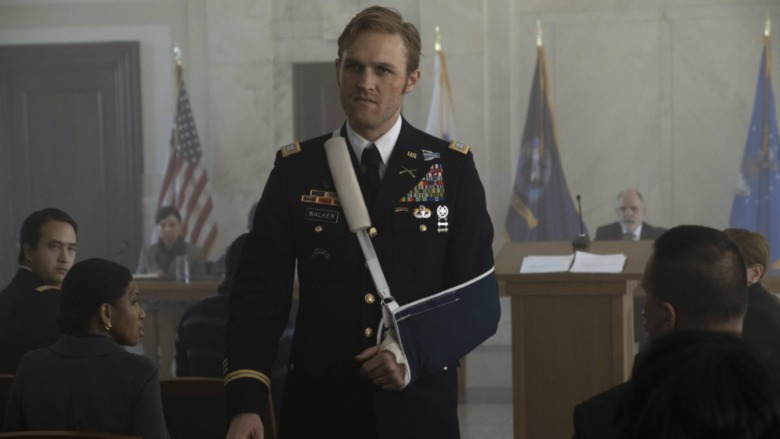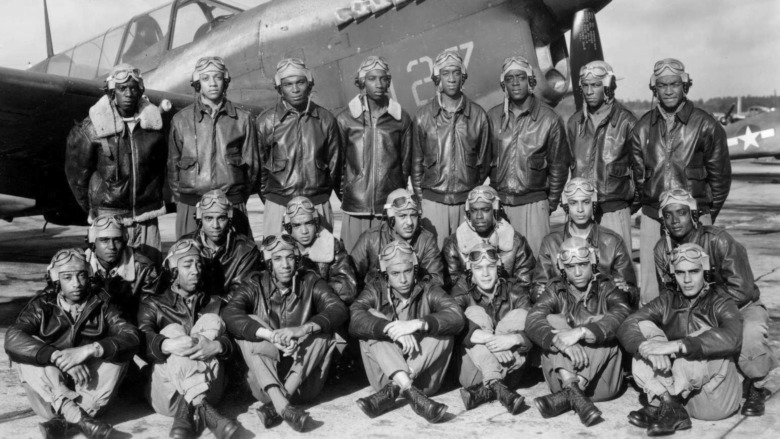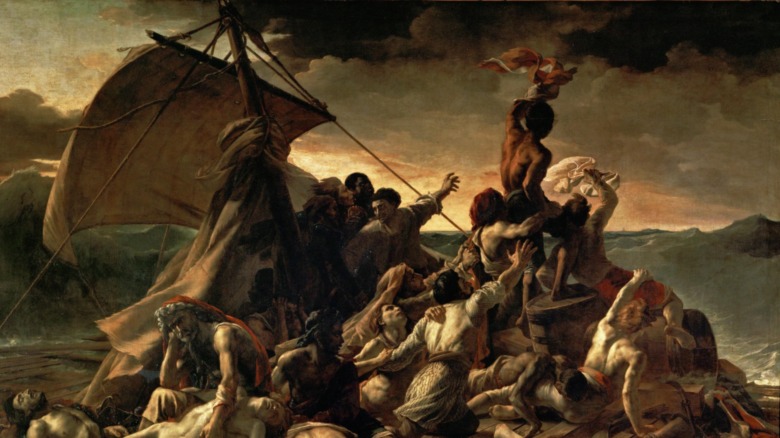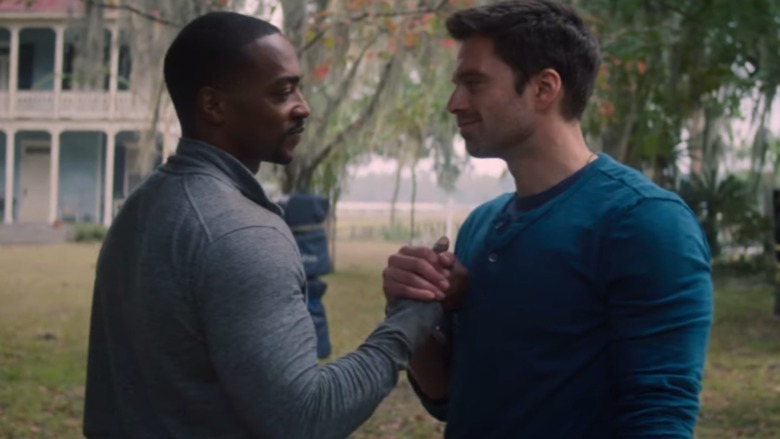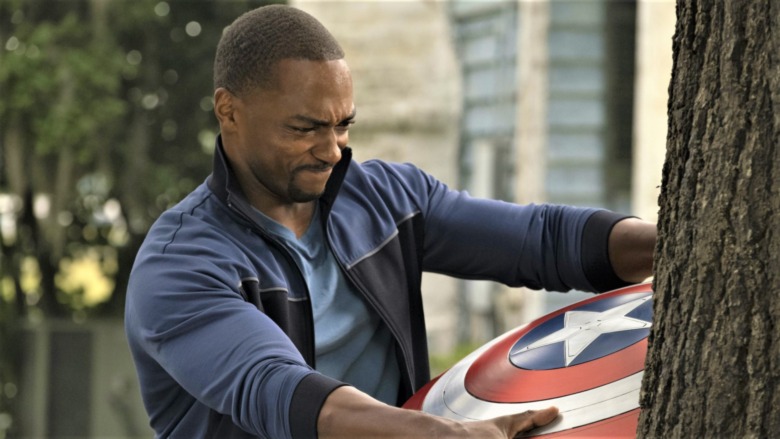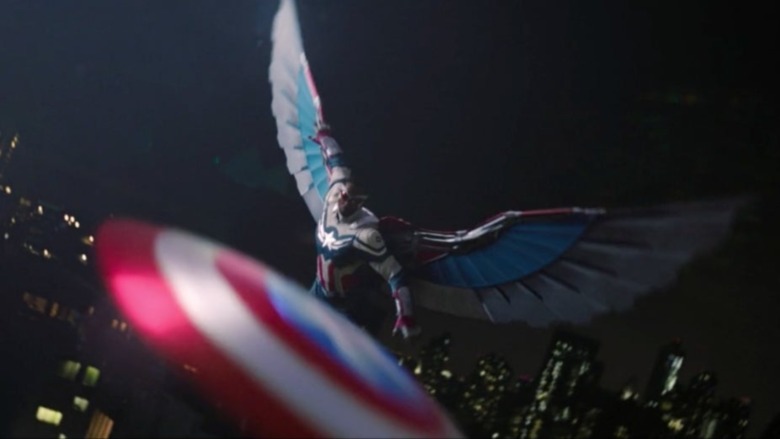Things Only Adults Noticed In The Falcon And The Winter Soldier
One of Stan Lee's most famous quotes about his comic book creations was that "Marvel has always been and always will be a reflection of the world right outside our window." This has never been more true than with the Disney+ show "The Falcon and the Winter Soldier."
With his red, white and blue costume and patriotic name, Captain America has always inherently been a symbol and stand-in for the United States' values, failings, realities and dreams. When Joe Simon and Jack Kirby decided to have Cap punch Hitler in the jaw on the cover of his very first issue in 1941 several months before the nation joined the war later that year, they were making a statement that the fascism of Nazi Germany was opposed to American ideals.
With this in mind, it should come as no surprise that passing on this potent symbol to a Black man would inherently create a new set of statements and spark a new flurry of questions about just what this new status quo would say about our nation both implicitly and explicitly. Just like Stan said, this season's storyline reflected the world right outside our window — so let's discuss some of the grown-up issues "Falcon" tackled in its debut season.
Sam isn't immune to real-world problems
In the first episode, Anthony Mackie's Sam Wilson goes to a local bank with his sister Sarah, played by Adepero Oduye, to get a loan to save their family business. Despite the fact that Sam is recognized as one of the Avengers who literally saved the universe, they are denied.
Though the banker they meet claims that this decision was made due to the end of the Blip and the return of several billion people, the fact remains that in the "world right outside our window," Black Americans are denied loans and mortgages at a significantly higher rate than white Americans even when they do everything right, have a good credit score and salary, and can place a sizable down payment. Traditionally, bank malfeasance has been one of the key methods used to segregate communities through practices like "redlining" and predatory loans.
Even though he's an Avenger, Sam can't escape this reality. He still has to work through the same issues as the people around him, and this is an important part of what makes him such an ideal candidate to become Captain America.
Bucky is still sleeping on the floor
During the first episode, Sebastian Stan's Bucky Barnes relives one of his many missions as the Winter Soldier during a nightmare. After killing an innocent bystander in the dream, Bucky wakes up, and viewers discover that he has been sleeping on the floor of his apartment.
Fans of "Captain America: The Winter Soldier" might remember when this exact phenomena was referenced by Steve Rogers and Sam Wilson in their first conversation. They talk about how, after having to sleep on the ground during their tours of duty, their beds feel like a "marshmallow" that will just let them sink right to the ground. It's the first point of real connection between the two, and it makes sense for this series, which acts almost as a spiritual successor of that movie in many ways, to reference it.
It also fits perfectly in line with the show's determination to incorporate real-world issues into its fantastical narrative. Bucky is clearly suffering from PTSD and dealing with some of the most common symptoms real-world veterans have to address, and being unable to sleep is one of the most significant health concerns veterans have to face after returning from deployment. Though the reasons for Bucky's PTSD (spending decades as a brainwashed super assassin with an indestructible metal arm) are out of this world, the consequences thereof are depressingly real and all too common.
The Tuskegee Experiments
After meeting the Flag Smashers in Episode 2 and discovering they are new super soldiers, Bucky takes Sam to meet Isaiah Bradley to discover how the super soldier serum might have returned. Isaiah is a super soldier who, in the comics, was the second person to become Captain America.
Played by Carl Lumbly in the MCU, Isaiah Bradley was one of a handful of Black soldiers who were experimented on in the 1950s and given different variations of potential super soldier serum replacements. The scientists lied to them, telling them they were being given tetanus vaccines before sending them off on missions in the Korean War, during which Isaiah even managed to defeat and literally disarm the Winter Soldier.
This narrative is the exact premise behind the real-world Tuskegee Syphilis Study, a medical research project that examined the effects of syphilis over the course of 40 years by purposefully infecting hundreds of Black men in order to observe the course of the disease throughout their lives. They were lied to just like Isaiah was, and, as a result, over 100 of the men died because of the study, and many of their partners were unwittingly infected with the disease as well.
The ongoing efforts to distribute the coronavirus vaccine has brought the study back into the national discussion as medical experts seek to overcome the vaccine hesitancy that this study, and other horrors like it, has created in many Black communities.
Not even an Avenger can escape racial profiling
After meeting Isaiah, Bucky and Sam begin walking through the neighborhood as Sam struggles with what he's just learned. Their discussion is stopped in its tracks when two policemen pull up, ask Bucky if Sam is bothering him, and then demand to see Sam's ID. The police don't back down until Bucky finally points out Sam is the Falcon and one of the police officers recognizes them as Avengers. The police then very calmly, politely, and apologetically arrest Bucky for missing his court-mandated therapy session, a stark contrast to the hostility they had just shown Sam.
Racial profiling is one of America's oldest problems, and this scene is an excellent example of how inescapable it can be. A person's appearance, status, and clothing doesn't matter; it can happen to anyone, and there are many real-world examples that show this. The esteemed Georgia Congressman John Lewis was arrested over 40 times throughout his life, even after he became a member of Congress. In 2009, Harvard professor Dr. Henry Louis Gates Jr was arrested in his own home after accidentally locking himself out of his house. More recently, a Black army officer in Virginia was threatened by police officers and arrested in Virginia while in uniform.
There is often an attempt to dismiss stories like these and claim that this only happens to those who "look like trouble," but this scene (and the real-life stories it imitates) show that simply isn't the case.
It's basically a buddy comedy movie
Despite being named "The Falcon and the Winter Soldier," Bucky and Sam don't actually interact at any point during the first episode, but as Episode 2 carries on, it becomes increasingly apparent that this show is clearly a buddy comedy series (also commonly referred to as a "Buddy Cop Show"). Between landing on top of each other face first after narrowly escaping a group of super soldiers and later having to sit so close to each other that their legs are intertwined, the early stages of the series go to great lengths to show how uncomfortable the two men are around each other at first.
As is the nature of this type of story, however, the two have become fast friends by the end of the series, and their growing bond is one of the highlights of the entire season. By the time the fifth episode comes around, Sam is willing to help Bucky sort through some of his mental health struggles, and Bucky is willing to open up to Sam far more readily than he was in Episode 1 or 2 with his actual therapist.
The dangers of nationalism and supremacy
Eventually, the Falcon and the Winter Soldier go to Daniel Brühl's Baron Zemo for help. Hydra holds the secret to the new super soldier serum, and Zemo holds the secrets of Hydra. As they travel with Zemo and interact more with the Flag Smashers, two strong themes slowly come to light: the nature of nationalism and the danger of supremacists.
As Sam tries to talk the Flag Smashers down peacefully, viewers learn that they abhor nationalism, the belief that one nation or people is better than others. They lived through the Blip and saw the good that came out of the catastrophe; borders opened, and wars ceased as nations worked together to overcome the tragedy. Zemo, on the other hand, believes that no matter how noble their goals may be, the Flag Smashes are irredeemable because they sought the power of the super soldier serum in order to impose their will and worldview upon others. In his mind, this makes them supremacists who will inevitably kill "lesser people" for the good of their cause.
Both Zemo and the Flag Smashers' ideologies touch on different aspects of the same problem: authoritarianism. Throughout history, intense nationalism and (often white) supremacy have worked hand-in-hand to create fascist regimes with disastrous consequences. The series takes great pains to show that both Zemo and the Flag Smashers are right to oppose their respective evils, but that the bloody way they do so isn't justified by their ultimate goals.
John Walker, a dark mirror of Steve Rogers
Once Wyatt Russell's John Walker takes the serum in Episode 4, the show starts using creative imagery to directly parallel Walker with his predecessor, Chris Evan's Steve Rogers. As he chases down the Flag Smasher, Nico, who kept him from saving his partner's life, Walker jumps through a window to a street below, mirroring Steve being thrown up into a building in "Captain America: Civil War." Where Steve rises to the occasion, Walker literally falls.
Similarly, once Walker finally catches up to Nico, he raises his shield above his head with both hands before slamming it into Nico's chest and killing him, mirroring the moment Steve uses the same move in "Civil War" to deactivate Iron Man's armor and end the fight. Again, where Walker snaps and murders a man in a heated rage, Steve keeps his cool and only does what's needed to end the fight.
These images and the constant comparisons made between Rogers and Walker throughout the first four episodes are used to incredible effect to make the audience ponder and discuss what makes someone a good Captain America. Why does Steve succeed where Walker fails? The brilliant thing about these discussions, however, is that any exploration of what makes a man worthy of the symbol of the United States is inherently a discussion of what the country and its people should strive to be, creating a national discussion disguised as character discourse.
John Walker, a dark mirror of America as a whole
By far the most shocking image in the entirety of "The Falcon and the Winter Soldier" is the shot at the end of Episode 4, "The Whole World is Watching." John Walker is standing and staring at hundreds of people while holding Captain America's shield, now covered in the blood of the defenseless, unarmed man he just murdered in a heated rage in broad daylight.
The shot is chilling and immediately calls to mind the disturbing aspects of American history. Until this moment, Marvel has taken great pains to portray Captain America and his shield as symbols of pure heroism that represent the highest ideals that America often purports to stand for. By literally bloodying that very symbol, the image reminds the viewer of the many ways that America has fallen short of those values throughout its existence.
More specifically, the entire sequence is reminiscent of one of the most constant news topics of the last year: police violence in America and the use of excessive force and violence. Walker killing the citizen of a foreign nation in a place where he likely had little or no jurisdiction also calls to mind the many instances of American interference in foreign policy.
"You BUILT me."
In Episode 5 John Walker loses the shield, is found guilty by a military court, and is stripped of the title of Captain America. During the hearing, he lashes out at the panel and exclaims that he lived his life by and dedicated it to their mandates, that he had been what they told him to be and done what they had trained him to do, and he finished his tirade by saying: "You built me."
In Walker's eyes, the government is punishing him for doing exactly what they wanted, not for murdering a man, but for doing it where others could see, for saying the quiet part out loud. This expertly continues the idea that, unlike Steve Rogers, Walker's Captain America symbolizes the often-dark reality of what America is rather than the dream of what it could be.
John Walker's crumbling mental state and his feelings of abandonment in that scene also speak to common failures of care that veterans experience when they return from deployment. Veterans with post-traumatic stress disorder are often left untreated, and many are completely unaware of how to access the mental health resources they have at their disposal.
The Tuskegee Airmen and the treatment of Black veterans
After Falcon and the Winter Soldier take the shield back in Episode 5, Sam visits Isaiah while trying to decide if he'll take up the mantle of Captain America. During their conversation, Isaiah explains why the "stars and stripes don't mean nothing good to me."
He tells Sam that they used to be pretty similar until Isaiah's eyes were opened after he saw the treatment of African-American soldiers when they returned from war and after his own treatment after his time in the Korean War. In an emotional scene, Isaiah tells Sam how he went AWOL to rescue prisoners of war and bring them home, but where Steve did this and was heralded a hero in "Captain America: The First Avenger," Isaiah was seen as a criminal, arrested, declared dead, and experimented on for 30 years.
The scene is intense and emotional and very, very real. Though Isaiah's specific circumstances are fantastical, the nature of what happened to him is rooted in reality. During his talk with Sam, Isaiah directly references "men in the Red Tails, the famous 332." These are the Tuskegee Airmen, the famed all-Black fighter squadron who fought in World War II. Isaiah mentions how they didn't come home to fame or thanks but to racist persecution, which is exactly what happened when Black veterans returned home. Reddit user "hattiexcvi" compiled a solid list of examples of the history the show drew from in presenting Isaiah's story.
The symbolism of The Raft of the Medusa by Théodore Géricault
In Episode 5, a brief look at a painting is used as a transition shot before showing Sharon Carter speaking on the phone. The surface implication is that this is one of the many paintings that Carter has to sell on the black market, but as Reddit user GuyErebus explains, there is a wealth of symbolism behind the use of this painting and its relation to the themes of the series.
Named "The Raft of the Medusa" by painter Théodore Géricault, the work of art depicts the aftermath of the wreck of the Medusa, a French navy vessel that ran aground in 1816 due to incompetence of its captain, who had only received the position because of his connections to the French government. The captain used the ship's only lifeboats to save himself and the other officers, leaving the working-class sailors to starve on a hastily-made raft for 13 days before they were finally rescued.
When the painting was unveiled in 1819, it proved highly controversial for many of the same themes embraced in "The Falcon and the Winter Soldier." The painting's apex features a Black man working hand-in-hand with a white man while waving a flag, making its feature in this show quite appropriate. Additionally, John Walker is literally an incompetent "Captain" chosen by a corrupt government (the GRC) who are withholding resources from and persecuting the working class refugees created by the Blip.
Sam Wilson, Veterans Counselor
When Anthony Mackie played Sam Wilson for the first time in "Captain America: The Winter Soldier," the first and most telling trait they established for his character was that he was a counselor for veterans. The fact propels the entirety of his first conversation with Steve and forms a significant part of the foundation of their friendship. Steve even seems to honor Sam in "Avengers: Endgame" by working as a counselor himself.
The series uses this background to shape Sam's character and his responses to the events surrounding him. When he first meets Karli, he empathizes with her and uses his training as a counselor in an attempt talk her down and convince her to pursue her goals without violence. Similarly, when he practices using the shield with Bucky in Episode 5, Sam helps him work through his issues, telling him that "You gotta stop looking at others to tell you who you are," and that if he wants to get out of his personal hell, he needs to do the work and help the people he hurt as the Winter Soldier for their sake, not his.
These scenes are some of the best moments in the series, showing audiences exactly why Sam will make such a good Captain America. As he says in Episode 6, he believes in the good in people and his super power is that he genuinely believes we can all do better.
"We built this country."
After his debut as the new Captain America at the end of the series, Sam Wilson visits Isaiah Bradley once again and explains why he took up the shield. Sam explains that after the pain and suffering people like Isaiah had gone through before Sam, that after so many African-Americans had bled for the United States, he was not about to let anyone tell him that he couldn't fight for his country. He tells Isaiah, "We built this country." In many ways, he's right.
The thirteen British colonies that would eventually become the United States were created, in part, with the use of slave labor. When those thirteen colonies became states, their struggling economy was boosted and aided by the now extensive and entrenched use of slave labor, especially in the South, a fact that's referenced in "Hamilton" with its song, "Cabinet Battle #1." This even continued after the American Civil War, via the practice of sharecropping.
Basically, Sam looks back at all of the people who suffered to create the world he now lives in and decides that it's his duty to carry on that torch and keep fighting for a better world. Like Steve says in the beginning of "Captain America: The First Avenger," Sam sees everyone who has devoted their lives to this cause and believes that he's "got no right to do any less than them."
"Not a perfect soldier, but a good man."
"The Falcon and the Winter Soldier" has multiple themes running throughout its episodes, but at the heart of it all is one question: what makes someone a good Captain America?
By focusing on the theme, "Falcon" pays homage to Cap's original introduction to the MCU in "The First Avenger." Everything leading to Steve's transformation into a super soldier revolves around what makes someone a good choice for the program.
As Dr. Erskine says (and as Clé Bennet's Battlestar repeats), the serum takes what is already inside a person and amplifies it by giving them the power to finally act as they've always wished to. "Good becomes great. Bad becomes worse." This is why Erskine rejects one soldier early in the film. Though he was great soldier, he was a bully who would likely abuse any power he was given. Because of this, Dr. Erskine isn't searching for a "perfect soldier, but a good man."
These ideas forge the foundation of the entire series and explain why, once all is said and done, Sam Wilson is Captain America. The government chose John Walker because he was the perfect soldier, and it played out exactly as Dr. Erskine had feared. Even Bucky couldn't do it, because he's still trying to figure out who he is after spending decades as the Winter Soldier.
Sam Wilson, however, is a good, humble person who just wants to help everybody he meets become better people. It's hard to argue with the idea that we'd all like to see that character trait amplified in those around us.
